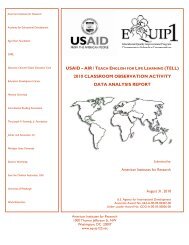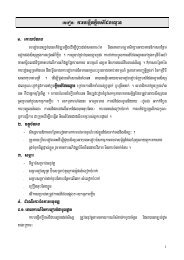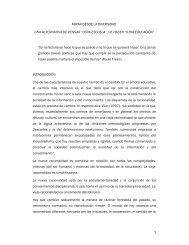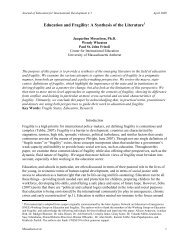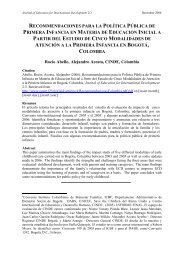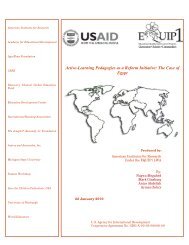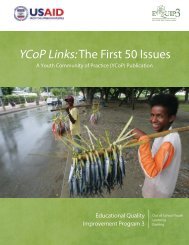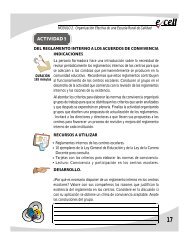The Power of Persistence: Education System ... - EQUIP123.net
The Power of Persistence: Education System ... - EQUIP123.net
The Power of Persistence: Education System ... - EQUIP123.net
Create successful ePaper yourself
Turn your PDF publications into a flip-book with our unique Google optimized e-Paper software.
and recipients. <strong>The</strong> World Bank has directly challenged the idea that host<br />
governments can or should be responsible for assuming the recurrent costs<br />
imposed by donor projects. In a 2002 report, the Bank argued that programming<br />
for outcomes (e.g. EFA) in countries where external funding represents a<br />
significant portion <strong>of</strong> the total budget requires sustained external support<br />
for program sustainability. <strong>The</strong>re is a logical and practical inconsistency with<br />
donors providing large-scale resources to achieve defined outcomes in the short<br />
term, but restricting the use <strong>of</strong> current and future funds from financing the<br />
recurrent costs that are incurred as a direct result <strong>of</strong> the external investment.<br />
Such assumptions seldom are based on a rigorous analysis <strong>of</strong> the financial or<br />
bureaucratic reality, and do not acknowledge the core reality that under-financed<br />
systems that cannot make up a deficit simply because it would be nice to do so<br />
(World Bank 2002). For example, FTI estimated the financing gap for countries to<br />
simply reach EFA goals (and not necessarily achieve a desired level <strong>of</strong> learning) at<br />
$836 billion in 2009 and over $1 trillion in 2010. This level <strong>of</strong> increased education<br />
budgets cannot be absorbed in the short term.<br />
<strong>The</strong> scale <strong>of</strong> financial commitment required for EFA to provide high quality<br />
education creates a genuine dilemma for the development community. On the<br />
one hand, both donors and countries must be realistic about the sizeable financial<br />
implications <strong>of</strong> programming for results. On the other hand, the financial cost<br />
<strong>of</strong> inputs ought not to replace the goals <strong>of</strong> development with an unending<br />
international subsidy and welfare system. This binary view <strong>of</strong> the issue has the<br />
potential for both creating dependence, and reducing the incentive for countries<br />
to confront hard policy issues.<br />
It may be useful to seek a definition for sustainability that balances between<br />
the extremes <strong>of</strong> unrealistic expectation <strong>of</strong> return on investment and unending<br />
subsidies to better capture the sense <strong>of</strong> development and usefully inform the<br />
debate on foreign assistance. Rather than an engineering process <strong>of</strong> replicating<br />
“best practices” and assuming costs, development is about evolution, growth,<br />
and continuous improvement. <strong>The</strong> most significant contribution <strong>of</strong> development<br />
programs may be in initiating and stimulating change, rather than starting<br />
project activities that cannot be continued without on-going subsidies.<br />
Michael Fullan, an internationally recognized expert in education reform at<br />
Canada’s Ontario Institute for Studies in <strong>Education</strong> (OISE) has addressed the<br />
challenges <strong>of</strong> sustainable reform in numerous books. Dr. Fullan takes a systems<br />
view <strong>of</strong> education development, pointing out that “system transformation <strong>of</strong><br />
the type educators now aspire to simply cannot be accomplished without first<br />
ensuring solid leadership at all levels <strong>of</strong> the system” (Fullan, 2002). Fullan’s view<br />
calls for structuring projects to encourage and support leadership development—<br />
SECTION 1: INTROdUCTION<br />
23



